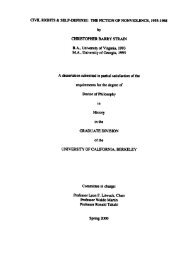Negro Digest - Freedom Archives
Negro Digest - Freedom Archives
Negro Digest - Freedom Archives
Create successful ePaper yourself
Turn your PDF publications into a flip-book with our unique Google optimized e-Paper software.
It should be made crystal clear<br />
what is meant by a black university<br />
. How much of the curriculum<br />
would be devoted to Afro-American<br />
people? How much of the curriculum<br />
would be devoted to disciplines<br />
other than Afro-American<br />
studies? Would the faculty be all<br />
black? Would the student body be<br />
all black? If white faculty and<br />
white students are excluded, do we<br />
expect so-called white colleges and<br />
universities to exclude all black<br />
scholars and black students?<br />
Would the Supreme Court permit<br />
this kind of segregation? Do we<br />
mean by black' universities regional<br />
centers of institutions that are already<br />
in existence, as one writer (in<br />
the March 1968 NEGxO DIGEST)<br />
advocates? If we mean regional<br />
black colleges and universities, the<br />
question of the complexion of the<br />
faculty and student body must still<br />
be asked and answered .<br />
Frankly, I do not believe we<br />
need to build a new black university<br />
in order to get what I think we<br />
need ; nor do I believe we need to<br />
concentrate on a few colleges and<br />
universities in certain centers of the<br />
United States in order to get what<br />
we need and must have . I believe<br />
that there could and should be<br />
established in every <strong>Negro</strong> or black<br />
college in the United States a division<br />
of Afro-American studies<br />
which would concentrate on the<br />
black man's history and all that he<br />
has contributed to the arts and sciences,<br />
literature and art, sports and<br />
drama, politics and business . I believe<br />
existing institutions can do<br />
7 0<br />
this, including the institutions that<br />
call themselves white .<br />
This is not enough . I have always<br />
believed that <strong>Negro</strong> or black<br />
colleges should be deeply concerned<br />
with and deeply involved in<br />
the life of the black community. Instead<br />
of training <strong>Negro</strong>es to get<br />
away from the poor and the ghettos,<br />
they should be trained to help<br />
improve the conditions of black<br />
people so that the gap between all<br />
classes of <strong>Negro</strong>es will be narrowed<br />
or eliminated. There are six million<br />
college and university students<br />
enrolled in institutions of higher<br />
education of which 240,000, or not<br />
more than four percent, are black ;<br />
certainly not more than 300,000 or<br />
five percent are black . A single<br />
black university of 10,000 would<br />
be a mere drop in the bucket. But<br />
if all institutions of higher learning<br />
tackled the problem of black identity<br />
through the teaching of Afro-<br />
American history and through<br />
training to help improve the conditions<br />
of less privileged black people,<br />
we could do now what has<br />
been neglected for a hundred years .<br />
<strong>Negro</strong> students are ready for it<br />
now . Years ago, when Dr . Carter<br />
G. Woodson, the eminent <strong>Negro</strong><br />
historian, was trying to get black<br />
students to appreciate themselves<br />
and Africa, he didn't have much<br />
success . And let me say, with emphasis,<br />
that to get this done we do<br />
not have to become racists and<br />
drive out all white teachers and all<br />
white students . With government,<br />
irdustry, and white institutions<br />
pulling black scholars apart to get<br />
March 1969 NEGRO DIGEST
















